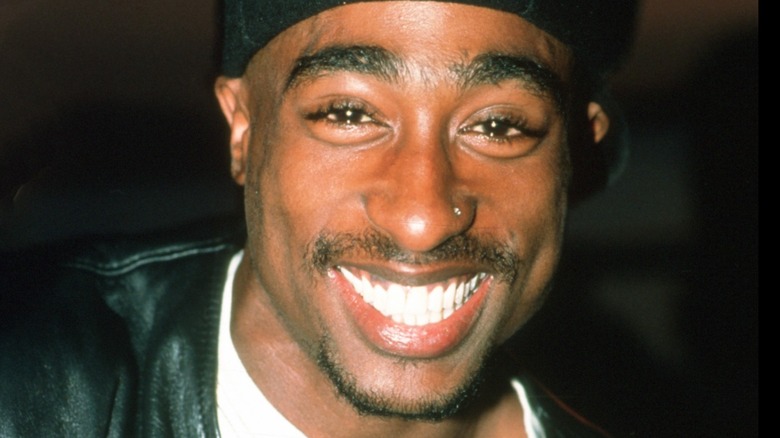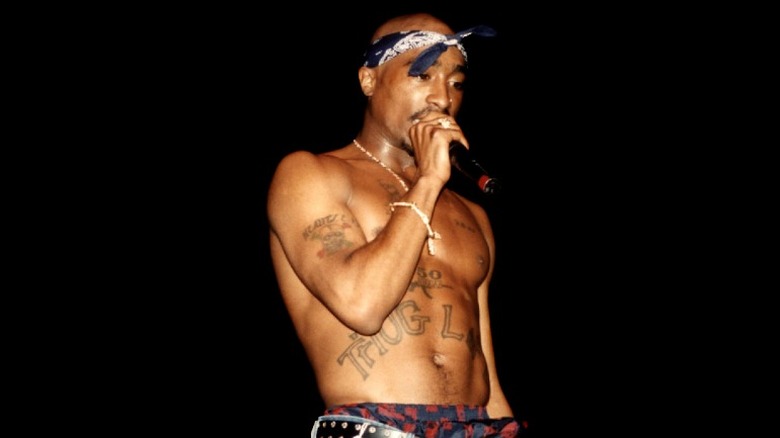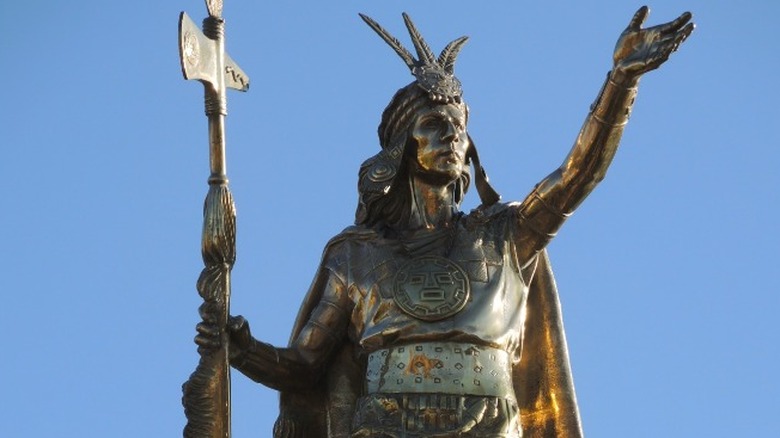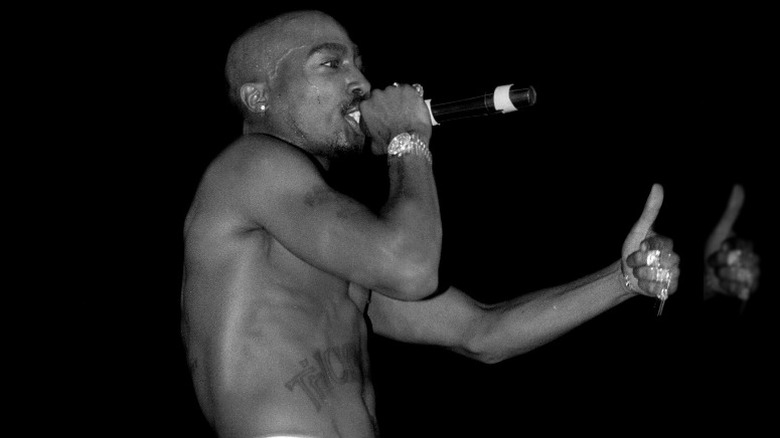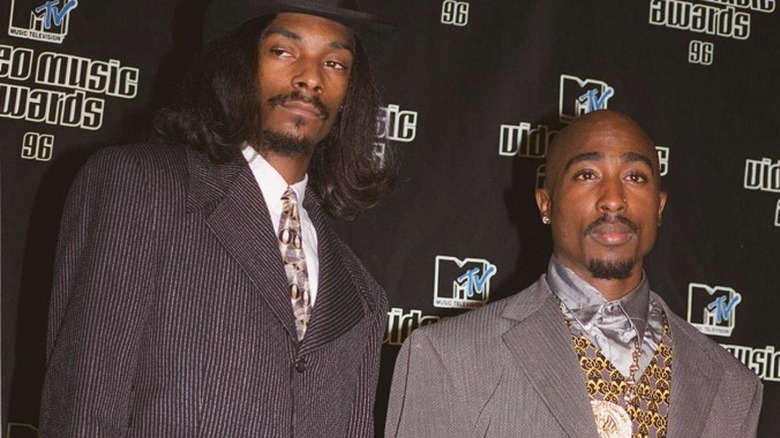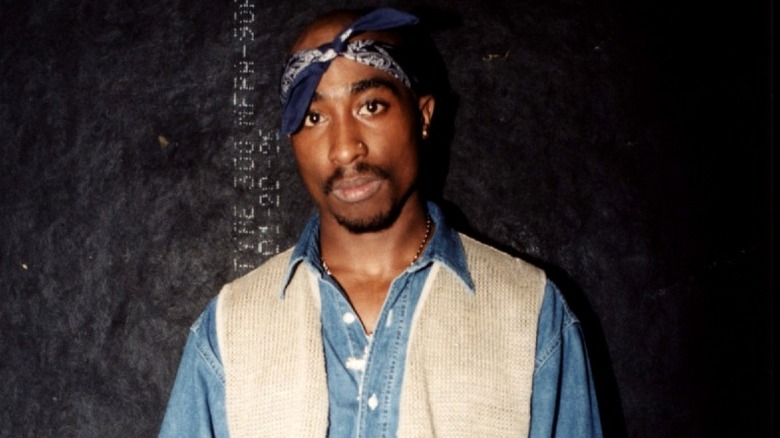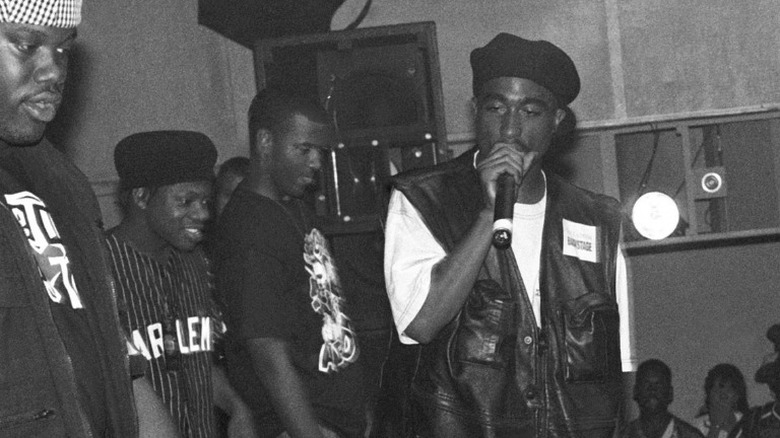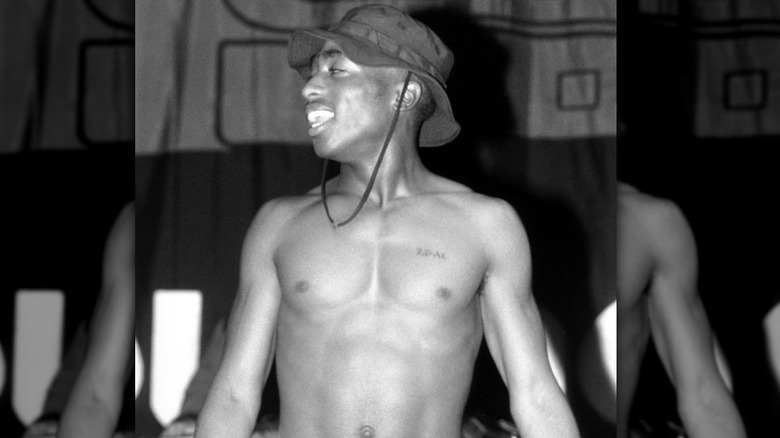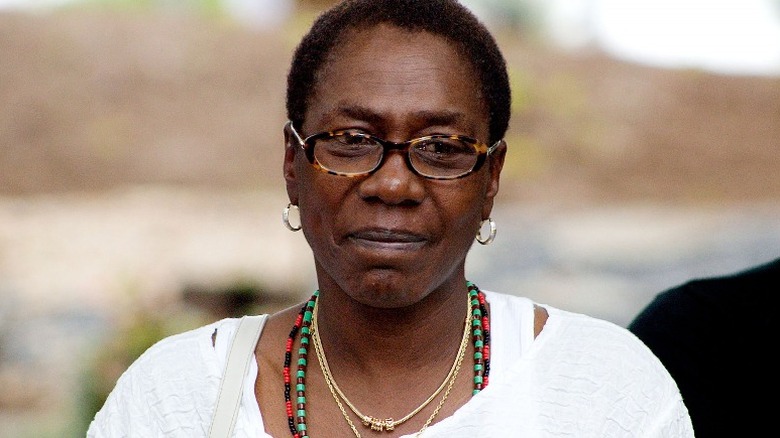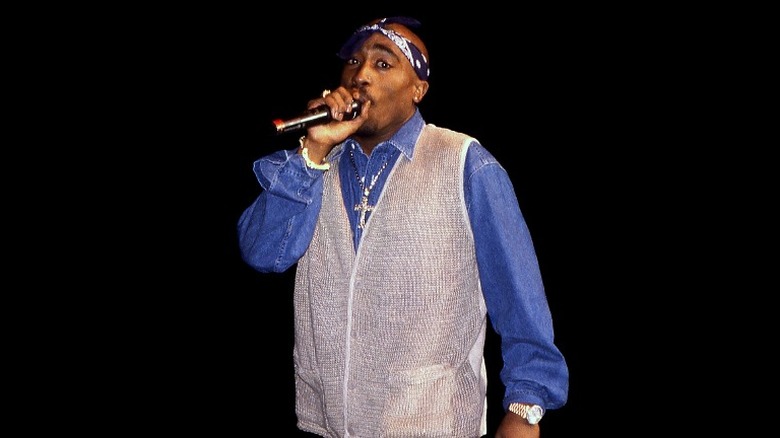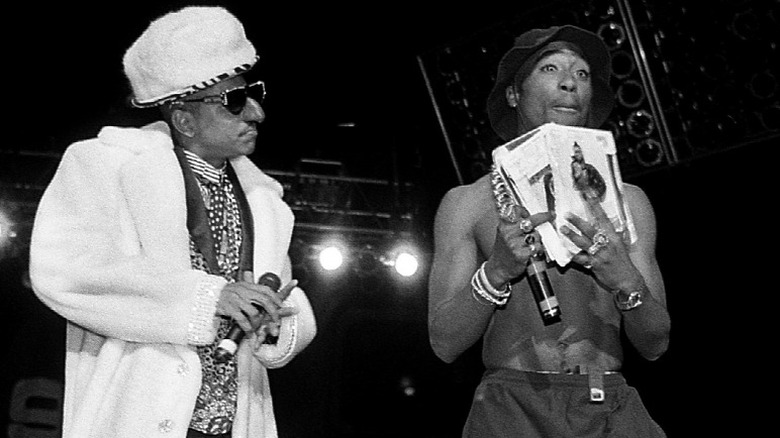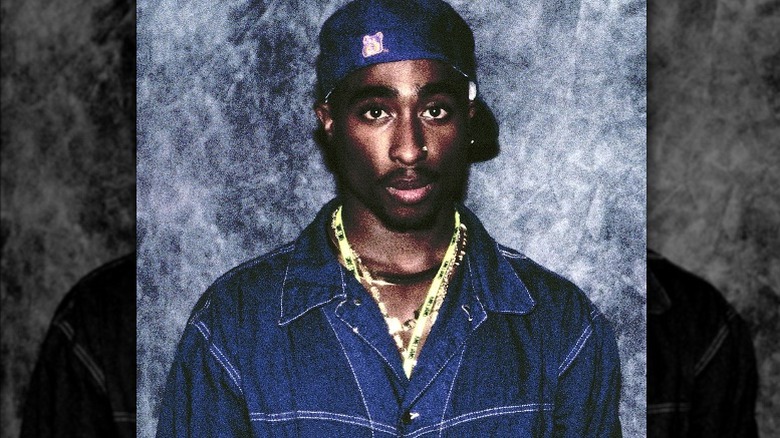The Untold Truth Of Tupac Shakur
To call Tupac Shakur one of the most legendary rappers of all time is an understatement, to say the least. He was born in 1971 in Harlem, New York, to Afeni Shakur, a Black Panther party member and activist (via Biography). She had initially become pregnant with Tupac while she was on trial for conspiracy to bomb a police department in New York, and she was acquitted just barely a month before he was born, per The New York Times). He spent his childhood and adolescence growing up in New York, Baltimore, and California, often struggling with incredible poverty.
His father lost contact with his family when he was just 5 years old, and it wasn't until nearly two decades later that Tupac finally saw him again. In the meantime, he had begun a very successful rap career, one that would eventually sell over 75 million records. He released his debut album, "2Pacalypse Now," in November 1991, and followed it up in February 1993 with "Strictly 4 My Niggaz."
Tupac Shakur released two more solo albums during his career before he was violently murdered in a drive-by shooting in Las Vegas in 1996. He was just 25 years old at the time and no one has ever been charged with responsibility for his death. Though he spent much of his last few years in the public eye, there is still a lot that even big fans of his do not know. This is the untold truth of Tupac Shakur.
He once rushed to visit a terminally ill child before he died
Tupac Shakur was an incredibly complex individual. He was famous for his lyrics that espoused violent, illicit, and often misogynistic themes, but he was also a deeply charismatic individual who was known for his incredible intellect and compassion. One of the more obscure anecdotes of his life, but one that truly shows the depths of his humanity, is his meeting with Joshua Torres in 1994.
According to The Baltimore Sun, Torres was an 11-year-old fifth-grader who suffered from muscular dystrophy. He was known as a funny and caring individual, though he could be shy at times, and he always remained upbeat despite his illness — even as it made him progressively weaker and sicker. His dying wish was to see his favorite rapper, Shakur, and meet him in person, and when he started to get really sick Torres' mother called a local radio station hoping to find a way to contact Shakur.
Amazingly, not only did Shakur talk on the phone with the young boy, but he even hopped on a plane and quickly flew to Maryland from New York to meet him. He spent over an hour with Torres, comforting him and making his last few hours as happy as possible (per "Tupac Shakur (Hip-Hop Stars)" by Clifford W. Mills). Torres passed just 45 minutes after Shakur left, having thankfully been given the opportunity to fulfill his dream of meeting his hero.
He is named after an Incan ruler
One of the more interesting aspects about Tupac Shakur is the origin and history of his name. He was originally named Lesane Parish Cooks by his mother Afeni when he was born. However, when he was a year old, his mother changed his name, according to Michael V. Uschan's biography "Tupac Shakur." She renamed him Tupac Amaru Shakur, after the Incan warrior and leader Túpac Amaru II, who had rebelled against the Spanish in Peru in the 18th century. The name Tupac Amaru means "shining serpent" in Quechuan, and Shakur means "thankful to god" in Arabic.
Per Uschan, Afeni purposefully named her son after a revolutionary and wanted him to embrace that kind of ideology and thinking as he grew up. Túpac Amaru had been born the great-grandson of the last Inca emperor, and he chafed under the Spanish authority that controlled his family's once vast independent empire (per Arizona State University). He organized a revolt against the Spanish in the late-18th century, killing over 1,000 Spanish soldiers before eventually getting captured and executed himself.
Though he was not able to overthrow the Spanish, Túpac Amaru II created a popular revolt that stood up for the poor in the face of violent foreign administration. Shakur's mother wanted Tupac to have this same revolutionary spirit — though likely sans the excessive violence.
He shot two police officers
In 1993, while he was in Atlanta after a concert, a young Tupac Shakur got into a serious involvement with a couple of off-duty police officers. According to The New York Times, the incident started when the two off-duty officers, Mark Whitwell and his brother Scott Whitwell, alleged that a car carrying members of Shakur's entourage almost hit them while they were crossing the street. An altercation ensued and Shakur ended up shooting both of the officers, one in his abdomen and the other in his buttocks.
Initially, Shakur was slapped with two charges of aggravated assault and was given a $55,000 bond. However, his lawyer immediately raised questions about what had happened during the incident, and he was backed up by eyewitness reports that stated that Mark Whitwell had been the first one to pull out a gun and Shakur had only been responding to that threat. The Times article made mention of Shakur's violent rap lyrics, and seemingly drew a connection with a 1991 lyric of his that described shooting a police officer.
The charges were later dropped after it was determined that not only were both of the officers drunk at the time of the altercation, but they had been carrying handguns, which had previously been stolen from the police evidence locker, as reported by The Baltimore Sun.
He covered a Neil Diamond song with Ice-T
In addition to his career as a rap superstar, Tupac Shakur is also relatively well known for his many acting roles. His first role came in the 1992 crime film "Juice," and he also starred in "Poetic Justice" — with Janet Jackson — "Bullet," and "Gridlock'd" (via Britannica). Yet, most people don't know that he also appeared on several TV shows around the same time.
His first appearance came on the show "In Living Color," which starred famous comedians like Jamie Fox, Jim Carey, and David Alan Grier (via IMDb). He starred in a sketch opposite Jamie Fox and Tommy Davidson, playing himself trying to get into a concert venue. Davidson and Fox were both playing security guards who refused to believe that he was who he said he was — until his huge security guards showed up.
He was the musical guest on both "Saturday Night Live" and "Saturday Night Special" in 1996 to promote his new album "All Eyez on Me." He performed "I Ain't Mad at Cha" off the album on "SNL" and got a huge applause from the audience. He hosted "Saturday Night Special" with Ice-T, who was also releasing a new album, and they performed "Only God Can Judge Me" together. Then, in a surprise twist, they also performed a humorous cover of Neil Diamond's "You Don't Bring Me Flowers."
He filed a $10 million lawsuit against the police
In 1991, Tupac Shakur, unfortunately, found himself the victim of severe police brutality in Oakland, California. That October, he was walking down the street when two members of the Oakland Police Department pulled up on him (via "Tupac Shakur" by Carrie Golus). They stopped him for the petty crime of jaywalking and demanded he identify himself. Shakur provided them with not one but three different types of identification, but that was still not good enough for the officers. For whatever reason, they had an issue with his name and didn't believe it was really Tupac Shakur.
As he explained in a 1991 interview with Davey D, he was simply minding his own business "walking down the streets" when "the [Oakland] police department saw fit for me to be trained or snapped back into my place." He yelled profanity at them and they responded by cuffing him and choking him unconscious. He was then arrested for resisting arrest.
He ended up filing a $10 million lawsuit against the OPD for excessive use of force. Originally, Shakur planned on using the proceeds to invest in the community and cut down on police brutality. However, the settlement only ended up being a fraction of what he wanted, $42,000, yet it was still a victory to get anything from the police for their brutal mistreatment of an African American.
Some 25 years later on June 16, 2016 — on what would have been Tupac Shakur's 45th birthday — Oakland Mayor Libby Schaaf officially proclaimed the day Tupac Shakur Day (via KQED).
He was once sued over his lyrics
Tupac Shakur's estate was, unfortunately, the subject of numerous lawsuits after his death. One of the more bizarre came from civil rights activist C. Delores Tucker. She filed a lawsuit against Shakur's estate alleging his 1996 album, "All Eyez on Me," had derogatory and defamatory statements directed at her (per the Los Angeles Times). The lawsuit was over two different songs from the double album, "Wonda Why They Call U B****" and "How Do U Want It," because Tucker was referenced in both songs. She asked for $10 million in the lawsuit, alleging "great humiliation, mental pain and suffering." She then sued several media companies who reported on the lawsuit and ridiculed the accuracy of her claims (via Justia).
This was not Tucker's first foray into lawsuits involving Shakur and his record label, Death Row Records, which was owned by Suge Knight at the time. In 1993, after failed runs for a seat in either house of the U.S. Congress, she began her crusade against the rap genre and started pushing for increased censorship of rap lyrics, per The Washington Post.
As reported by the Los Angeles Times, Tucker filed complaints with the U.S. Justice Department and FBI over the distribution of violent messaging in rap music to minors, and called for boycotts of numerous gangster rap record labels. Eventually, according to an issue of The News Media & The Law, the lawsuit against Shakur's estate was ultimately dismissed (via the Reporter's Committee for Freedom of the Press).
He took ballet classes in high school
Tupac Shakur is known for many things: rapping, being an entrepreneur, and acting. But what about ballet dancing? Strange but true, Shakur actually took ballet classes when he was in high school in Baltimore. The story starts back in 1985 when the Shakur family first moved to Baltimore from White Plains, New York (per "Tupac Shakur"). At first, Shakur attended Rolling Park Junior High, before he was accepted at the prestigious Baltimore School for the Arts for high school.
He was one of the few African American kids at the school, but he was popular and he felt accepted by most of his classmates and teachers. While at Baltimore, he developed a passion for Shakespeare, and he started to take some ballet classes, too. He found himself deeply inspired by the atmosphere of the school and New York City, and he even saw a few Broadway shows.
It was also in Baltimore that he met longtime friend Jada-Pinkett Smith. She went to the same high school as Shakur (via "Today"), and they bonded over their parents' similar economic problems and drug addictions to crack cocaine. He only attended the school for a few semesters, dropping out prior to the start of his senior year (via The Baltimore Sun).
If you or anyone you know is struggling with addiction issues, help is available. Visit the Substance Abuse and Mental Health Services Administration website or contact SAMHSA's National Helpline at 1-800-662-HELP (4357).
He has a song in the National Recording Registry
Even though his career spanned just shy of a decade, Tupac Shakur is still one of the highest-selling artists of all time. He has 11 platinum albums, only four of which were released while he was still alive (via Biography). As of 2017, he had sold over 75 million records, which was then the 44th most all-time, according to the Recording Industry Association of America (RIAA).
In 2010, the Library of Congress (LOC) officially recognized the impact and talent of Shakur on rap music in America and added his song "Dear Mama" to the LOC's National Recording Registry, per NPR. It was one of several entries added that year, including Little Richard's "Tutti Frutti" and Cliff Edwards' "When You Wish Upon a Star."
"Dear Mama" had appeared on Shakur's third album, "Me Against the World," and was an homage to "his mother and all (mainly single, lower-income) mothers who struggle" (Afeni Shakur pictured above) (per the Library of Congress). Fans have praised not only the lyrical content, a departure from many misogynistic rap songs, but also the "tight" song and rhyming structure.
Interestingly, Shakur was actually in prison at the time "Dear Mama" was released as a single, so he couldn't appear in the music video. Instead, they got a lookalike to stand in for him, and most of the shots featured him as a child rather than an adult.
He moved almost 20 times by the time he was 10 years old
Growing up in New York was incredibly tough at times on Tupac Shakur, in large part because of the extreme poverty he faced. His mother Afeni Shakur had trouble finding work when he was young, partly because she was a high school dropout without many marketable skills. Her reputation was also completely tarnished as the result of her trial on allegations of conspiracy to bomb New York City (via "Tupac Shakur: The Life and Times of an American Icon").
She later found work at a nonprofit organization, and she married Tupac's stepfather Mutulu Shakur when he was in kindergarten. Mutulu had gotten involved with "the Family," an amalgamation of former members from several militant black civil rights groups, including the Weather Underground and the New Black Panther Party. As a part of "the Family," he participated in the famous 1981 Brinks Robbery, barely making it out without being arrested. Afeni ended up losing her job over her husband's involvement in the robbery, and the family was thrust into homelessness.
They stayed wherever they could to survive, often living in homeless shelters and with family members who could accommodate them. Tupac estimated that he, his mother, and his sister moved at least 18 times before he was 10 years old. It was upsetting for Tupac to endure such isolation and poverty; he once admitted to an interviewer, according to biographers Tayannah Lee McQuillar and Fred L. Johnson, that he "was crying all the time."
His first job in the industry was as a roadie
When Tupac Shakur was just a teenager, all he wanted to do was find a way into the music industry. He had trouble finding work and occasionally sold illicit drugs on the streets to make money, but even fellow drug dealers saw his artistic talent and encouraged him to pursue music over a life of crime, according to Carrie Golus in "Tupac Shakur." In 1989, he met his future manager, Leila Steinberg, while she was sitting at a city park reading a book by Nelson Mandela's wife. He came up to her out of nowhere and started discussing the book — much to her shock, and delight.
Soon afterward, she introduced him to the owner of upstart TNT Records, Atron Gregory. One of the label's artists was Digital Underground, whose members were fresh off the success of their hit single "Humpty Dumpty." Shakur got a job as a roadie for the band on their 1990 international tour of Japan and the United States, though he also occasionally performed some songs with them onstage. He appeared on their 1991 track "Same Song," and later the entire group appeared in the film "Nothing But Trouble," performing the song in the middle of a courtroom. Though the movie got pretty rough reviews, it was Shakur's first experience acting in a movie.
He received death threats as part of an extortion scheme
Of the many odd twists and turns that Tupac Shakur's life took, one of the more bizarre was his little-known ordeal with the Jewish Defense League. In 2011, the FBI released documents relating to their investigation of Shakur's 1996 murder, and they included information about the alleged scheme (via Haaretz). According to FBI documents, the JDL and others were involved in an extortion scheme targeting famous rappers. Not only was Shakur allegedly targeted as a victim, but the JDL also tried to extort fellow California rapper Eazy-E at around the same time — making death threats against both of them.
The scheme was complex and involved multiple levels of deception. As the documents show, first, someone secretly affiliated with the JDL would call the victim on the phone and make various mortal threats against them. Then, a different affiliate of the JDL would again call the victim and offer protection and a "safe haven" — for a small fee, of course. After placing the victim under the protection of armed guards, the second affiliate would lead them to believe that everything was peacefully worked out and there would be no future problems. Neither Shakur nor Eazy-E fell victim to the scheme but were coincidentally both targeted just before they died.
The JDL, founded in 1968, is labeled as a hate group by the Southern Poverty Law Center (SPLC) and a terrorist organization by the FBI (via the SPLC).
